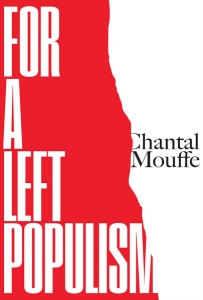Book Review | For a Left Populism by Chantal Mouffe
In For a Left Populism, Chantal Mouffe argues that our contemporary ‘populist moment’ represents an opportunity for democratic reinvigoration through the formation of a left populism in the name of radical democracy. The book marks an important intervention, most especially in its work on the political role of affect, finds Matthew Longo, but he remains unconvinced as to whether Mouffe’s vision of agonistic contestation will pave the way for a return of the political.

Picture: Marco Nürnberger (CC BY 2.0)
For a Left Populism. Chantal Mouffe. Verso. 2018.

Populism is a strange term in that its relationship with ‘the people’ is ambiguous: certainly, it is not inherently democratic. And it always begs the preceding question of which people are included in the frame. But while dismissing populism as necessarily proto-authoritarian is tempting, this may be too quick. Here is where Chantal Mouffe comes in. Her new book, For a Left Populism, argues that our contemporary ‘populist moment’ represents an opportunity for democratic reinvigoration – but only if the left combats right populism, with its proto-authoritarian tendencies, with a left populism in the name of radical democracy.
By her account, the populist challenge to western liberal democracies is borne of a crisis of neoliberal hegemonic formation – Mouffe focuses on Europe, although the Brexit campaign in the UK and the rise of Donald Trump can be seen in the same light. Following the triumph of Thatcherism, she argues, neoliberalism became so dominant that politics was reduced to technical questions to be handled by experts, foreclosing meaningful popular debate – a condition she describes as ‘post-democracy’. This run of neoliberal hegemony was interrupted in 2008 by the financial crisis, after which the entire order was called into question, affording a space for anti-establishment movements from both sides of the right-left spectrum. This ‘populist moment’ serves as the warrant for the book.
Mouffe’s primary intervention is that the success of right-wing populist movements should not encourage the left to try and reclaim the centre, but to offer a populist alternative – i.e. by constructing its own frontier between ‘the people’ and the ‘establishment’ along progressive lines. In contrast to right populism, which constitutes the people through xenophobic or ‘national’ rhetoric (especially against immigrants), left populism can do so via the language of social justice (especially against ‘the oligarchy’) in such a way that it ‘addresses the diverse forms of subordination around issues concerning exploitation, domination or discrimination’ (61). The contestation between these two discursive constructions would pave the way for a ‘return of the political’ after years of post-democracy.
The normative case that undergirds Mouffe’s defense of left populism follows from her critique of the neoliberal hegemonic order in which liberal principles (the rule of law, individual freedom) became dominant over democratic ones (equality and popular sovereignty). The lack of meaningful political contestation trivialises popular sovereignty; the ‘expansion of the financial sector at the expense of the productive economy’ paves the way for oligarchisation which compromises equality, the ‘other pillar of the democratic ideal’ (17-18). Taken together, these two features of the neoliberal hegemonic order have undermined the normative basis of democracy.
For those familiar with Mouffe’s writing on agonism, this critique comes as no surprise. In her theoretical worldview, society is inherently ‘divided and discursively constructed through hegemonic practices’, and thus politics entails ‘a dimension of radical negativity’ (10; 87). There is no politics without we/they divisions. A healthy democracy is one in which these competing visions find expression. What matters is that they are constituted in ways compatible with pluralism – i.e. ‘that conflict when it arises does not take the form of an ‘‘antagonism’’ (struggle between enemies) but of an ‘‘agonism’’ (struggle between adversaries)’ (91).
The question, then, is one of political identification: how do people come to be part of a ‘we’? This depends on affective appeals, a notable break from the left, which Mouffe believes fails to take seriously popular interests – to take people ‘as they are’ (pace Jean-Jacques Rousseau), rather than as we hope them to be:
Instead of designating the adversaries in ways that people can identify, [the ‘extreme left’ uses] abstract categories like ‘capitalism’, thereby failing to mobilize the affective dimension necessary to motivate people to act politically (50).
Her point is well taken. If democracy depends on citizen participation, then it matters greatly how we persuade people to get involved. By focusing on affect, Mouffe takes us away from the internecine ideological debates of left politics and towards practice – emphasising not the what but the how. Since affective appeals work differently across space and time, each polity needs its own context-specific platform, something that well-designed populist parties can address.
This is an important intervention, but Mouffe could have profited from taking her own advice – in this case, by better instantiating her principles in practice. She makes oblique references to some left European populist movements – Podemos, for example, and Syriza – but without any indication of how to interpret their political ventures. Were these parties successful in their affective appeals? What lessons might aspiring left populist parties glean from their experiences? Are certain political conditions less propitious for left populist movements than others? In its present form, it is hard to see the argument as any less abstract than those she critiques. As Mouffe points out, not all democratic domains would handle a battle of left and right populisms in the same way. In order for the left to utilise her suggestions, it is essential to outline something of the conditions that left populist appeals require.
It may be that Mouffe thinks such an empirical discussion is outside the bounds of her critique. But insofar as the book is prescriptive, it is hard to see how this could be true. By ignoring specific conditions in contemporary western societies, she leaves herself vulnerable to very straightforward contextual critiques – especially about conditions of ideological polarisation. Many contemporary western states are so divided that political contestation appears less about taking hold of the centre than galvanising extreme peripheries. Ultimately, this could be a recipe for the eradication of common discourse between movements. In such a case, rather than create the terms for agonistic confrontation over unified organs of state, left populism would only exacerbate the divide – thereby feeding antagonism, the precise outcome Mouffe seeks to avoid.
This issue is perhaps clearest with regard to our polarised media environment. We are increasingly divided as societies between epistemic communities with different sources of ‘truth’ or ‘knowledge’, embodied by the scourge of so-called ‘fakenews’. As such, the problem is not that we don’t have two agonistic competitors for the centre, but that even if we did, they might not have a unified public sphere over which to struggle for control. How can two sides compete agonistically, if they cannot hear each other? This fact is exacerbated when these communities are also geographically polarised – as, for example, in Germany or red-/blue-state America. In such cases, without a unified public sphere, populist struggle may prompt a kind of soft secessionism, with movements attempting to split the centre, rather than reclaim it.
In our age of extreme polarisation, it is not clear that agonistic confrontation is the right approach. Instead, we might want to dedicate our energies towards rebuilding central political institutions and regenerating a unified public sphere. Either way, by not addressing the structural basis of our divided polities, Mouffe sidesteps the issue entirely and leaves her supporters without guidance about arguably the central challenge facing the contemporary West. We can all appreciate the gravity of this concern. Without a consolidated centre to fight over, agonistic contestation may not reinvigorate democratic institutions, but tear them apart.
This review gives the views of the author, and not the position of Democratic Audit. It was first published on the LSE Review of Books blog.
Matthew Longo is Assistant Professor of Political Science at Leiden University. He received his PhD with distinction from Yale University in 2014 and was awarded the Leo Strauss Award for the Best Doctoral Dissertation in Political Philosophy, given by the American Political Science Association. Twitter: @matthewblongo





 Democratic Audit's core funding is provided by the Joseph Rowntree Charitable Trust. Additional funding is provided by the London School of Economics.
Democratic Audit's core funding is provided by the Joseph Rowntree Charitable Trust. Additional funding is provided by the London School of Economics.